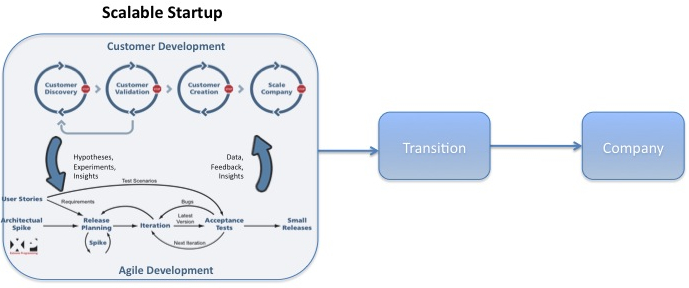Google "what is a technology startup." When you do this article I wrote back in 2009 will most likely show up as the second result right below the Wikipedia entry. The Wikipedia entry is a little more interesting to me at the moment than what I wrote five years ago. This is what it says:
A startup company or startup is a company, a partnership or temporary organization designed to search for a repeatable and scalable business model. These companies, generally newly created, are in a phase of development and research for markets."
The first sentence of definition was authored by Steve Blank. I have the utmost respect for Mr. Blank. His book The Four Steps to the Epiphany literally launched the lean startup movement. His books The Startup Owner's Manual: The Step-By-Step Guide for Building a Great Company
and Business Model Generation: A Handbook for Visionaries, Game Changers, and Challengers
by Alexander Osterwalder & Yves Pigneur are required reading for anyone looking to found a startup for the first time (and maybe certain serial entrepreneurs as well). I am a fan. However I strongly disagree with the above definition of a startup.
Here's why. It does not pass the reasonableness test. If you were to ask members of a startup community if certain companies were or were not startups they would more often than not classify companies that have repeatable and scalable business models in place as startup companies.
For example as I write this I am sitting in the offices of SalesLoft at the Atlanta Technology Village, a building specifically built to to support and inspire technology entrepreneurs. Salesloft participated in TechStars in 2012. Just a year ago Salesloft had no revenue. Now it is seeing high product demand. The company is growing fast. Both revenue and people. They have found a business model and a market. By the above definition they are not a startup.
Does Salesloft sounds like a startup to you? It sure does to me. The CEO and all the employees think they are a startup. But by the above definition they are not. The definition is wrong. The definition intentionaly excludes execution. That makes it too narrow. All successful startups execute. They execute to scale.
And this all may be a matter of semantics within Mr. Blank's own diagram of the startup process the act of scaling the company is included in the startup cycle.
Going back to my Salesloft example they have conducted customer discovery. They have customer validation. They have a repeatable business model. They are in the process of creating customers and scaling the company. They are a scalable startup but not as defined by Wikipedia.
When it is all said and done I think the Wikipedia definition of a startup just needs a little wordsmithing to something like this:
A startup company or startup is a company, a partnership or organization designed to search for and scale a repeatable business model.
Moving around a few words enables the definition of a startup to include companies such as Salesloft (which it should). It makes the definition of a startup include early execution (which startups do). It makes the definition of a startup pass the reasonableness test (which it must).
This refined definition defines startups better. And that would be a better thing.


